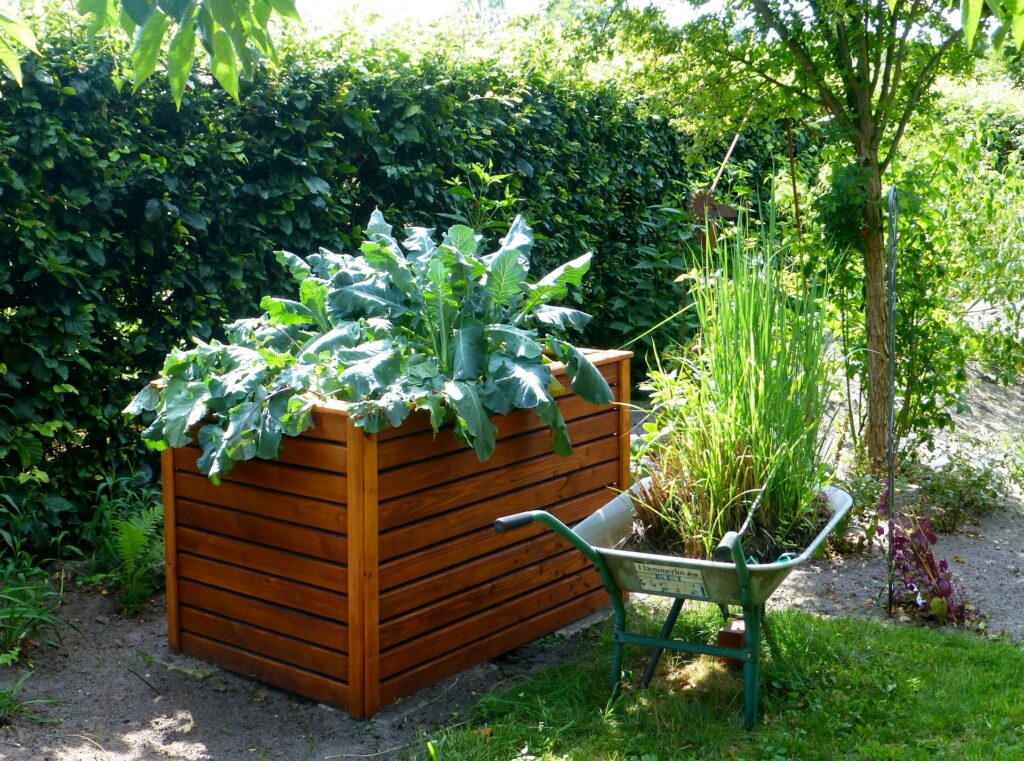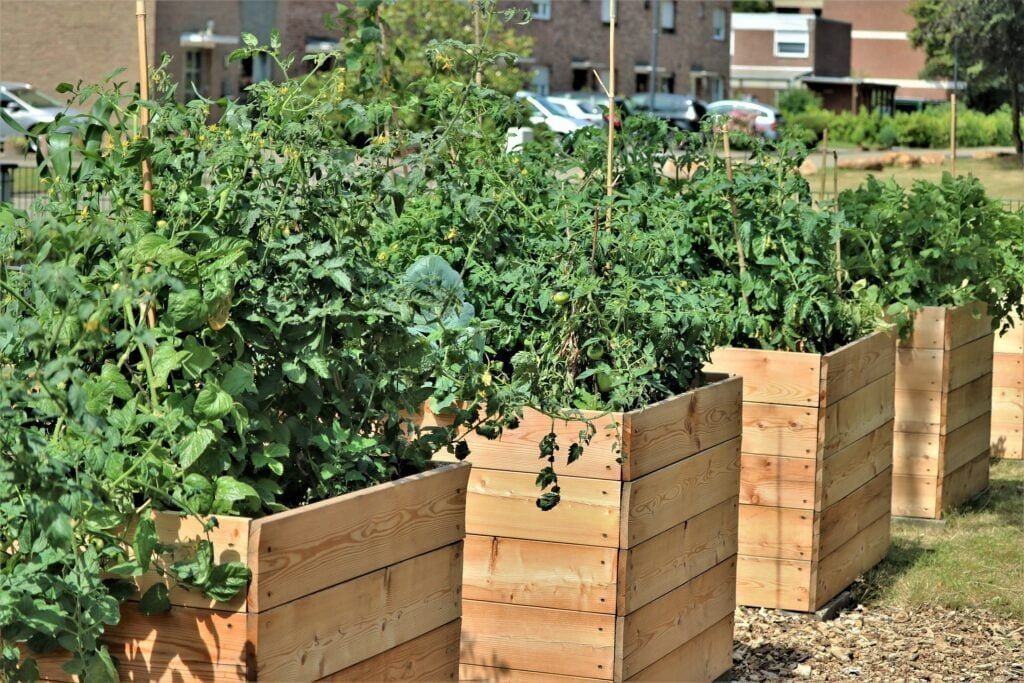
Raised garden beds are an excellent way to grow vegetables and other plants in an efficient and effective manner. By raising the soil above the existing ground level, raised garden beds provide several benefits, including improved drainage and soil structure, increased aeration, and better pest control. The improved drainage in raised garden beds is especially beneficial in areas with high levels of precipitation or areas that experience frequent flooding.
1. Increased Drainage:
Raised garden beds are great for ensuring that plants get enough drainage to thrive. The soil in raised beds warms up faster in the spring, allowing for earlier planting, and the raised height helps to keep the soil from becoming too soggy.
The improved drainage in raised garden beds is achieved through the creation of a shallow depression in the soil, which allows excess water to drain away more quickly. This depression also helps to keep the soil warm, which can help to speed up the growth of many plants. Additionally, the increased aeration in raised garden beds leads to improved soil structure and better root growth. The improved soil structure also helps to improve the fertility of the soil, allowing plants to receive the nutrients they need for healthy growth.
The improved drainage in raised garden beds also allows for better pest control. By creating a shallow depression in the soil, the roots of the plants are kept cooler, which helps to discourage pest activity. Additionally, the improved aeration and soil structure makes it more difficult for pests to settle in the soil and reproduce.
Finally, the improved drainage in raised garden beds can help to minimize soil erosion. By keeping the soil higher than the surrounding ground level, the soil is less likely to be washed away in periods of heavy rain. This helps to keep the soil in the beds healthy and productive, allowing for better plant growth.
Overall, raised garden beds provide numerous advantages to gardeners, including improved drainage and soil structure, increased aeration, and better pest control. The improved drainage in raised garden beds is especially beneficial in areas with high levels of precipitation or areas that experience frequent flooding. By creating a shallow depression in the soil, the roots of the plants can receive the nutrients they need for healthy growth while also discouraging pest activity. Additionally, the improved drainage in raised garden beds helps to minimize soil erosion and keep the soil in the beds productive.
2. Easier to Manage:

Raised beds allow for easier access to your plants. With the bed being raised, you can more easily weed, water, and harvest your plants. Plus, you’ll be able to avoid kneeling and bending down to tend to your garden.
Raised garden beds are a great way to create a contained, organized, and aesthetically pleasing garden. They make gardening much easier to manage and give you more control over the environment in which you grow your plants.
One of the primary benefits of raised garden beds is that they require less effort to maintain. The soil in raised beds is free of weeds and is easy to work with. You can control the moisture and nutrient levels in the soil, and can easily create an ideal environment for plants to flourish. This is especially beneficial for beginner gardeners. Raised beds also reduce the need for bending and kneeling, which can be difficult on the back and joints.
Additionally, raised garden beds are easier to access and work on, as they are higher off the ground than traditional gardens. This makes it much simpler to tend your plants and harvest crops. It also makes it easier to add fertilizers, aerate the soil, and adjust the pH balance.
Raised garden beds also help to conserve water and reduce the amount of weeds. The soil in raised beds warms up quickly and retains moisture, meaning you don’t have to water as often. The soil is also contained, meaning there’s no need to plow or till the soil in order to control weeds.
Finally, raised garden beds can be customized to suit your needs. You can choose the size, shape, and materials to best suit your space and budget. You can also add features like trellises for climbing plants, or a fence to keep out pests. With raised garden beds, you can design a garden that’s tailored to your individual needs.
In conclusion, raised garden beds are much easier to manage than traditional gardens. They require less effort to maintain and make it easier to access and tend to your plants. They also help to conserve water and reduce the number of weeds. Plus, you can customize them to best suit your needs. If you’re looking for an easier way to manage your garden, raised garden beds are a great option.
3. Pest Control:


The elevation of the soil within a raised garden bed helps to keep pests away from your plants. Slug and snail populations will be much lower within a raised bed, making it easier to protect your crops.
Raised garden beds are a great way to make gardening easier and more efficient. By raising garden beds, you can control pests better, keep soil from eroding, increase drainage, and improve soil fertility.
Pest control is one of the biggest benefits of raised garden beds. By elevating the soil, pests are unable to reach the plants and are kept away. This can help reduce the need for chemical pesticides and increase the yield of the garden. Additionally, raised beds can help prevent weeds from taking over, as the soil is elevated and more exposed to the sun and wind.
Finally, raised beds can improve soil fertility. The added elevation allows for better air circulation and better drainage. This can help keep the soil aerated and make it easier for plants to take up nutrients from the soil.
In conclusion, raised garden beds can help make gardening easier and more efficient. They can help control pests, keep soil from eroding, increase drainage, and improve soil fertility. All of these benefits make raised garden beds a great choice for any gardener.
4. Improved Soil Quality:
Raised beds can help to improve the soil quality of your garden, as the soil is not compacted by foot traffic or tilling. The raised bed will also help to keep the soil warm, which is important for allowing plants to grow and thrive.
Raised garden beds have become increasingly popular among gardeners due to their many benefits. One of the most important benefits of raised garden beds is their ability to improve soil quality. Raised garden beds allow for better drainage, improved aeration, and increased access to nutrients, all of which can improve soil quality.
Raised garden beds improve drainage because they are elevated from the ground. This allows excess water to drain away from the bed, preventing standing water and thus reducing the risk of soil erosion and root rot. Additionally, raised beds help to break up heavy soil, allowing for better water permeation and improved aeration.
Raised beds also provide increased access to essential nutrients. Soil in raised beds is more exposed to the elements and can thus benefit from increased exposure to sunlight, air, and rain. This exposure can help to break down organic matter, unlocking nutrients that are important for plant growth. In addition, raised beds can be filled with a mix of soil, compost, and other organic matter, providing additional nutrients that can improve soil quality.
Raised garden beds can also help to reduce the risk of pests and disease. The raised beds are more accessible and thus easier to inspect and monitor. This allows gardeners to spot any potential problems quickly, allowing for early treatment and control. Additionally, raised beds can help to reduce the risk of soil-borne diseases by limiting soil contact, as well as reducing the risk of cross-contamination.
Raised garden beds can provide many benefits to gardeners, but one of the most important is the improvement of soil quality. By improving drainage, increasing access to nutrients, and reducing the risk of pests and disease, raised garden beds can help to create healthier, more productive soils.
5. Easier to Plant:

With a raised garden bed, you won’t have to worry about tilling the soil or dealing with rocks and other debris
Raised garden beds are becoming increasingly popular with gardeners, because they offer numerous benefits. Raised garden beds provide an easier way to plant vegetables, herbs, and flowers. With raised garden beds, the soil can be amended with compost and nutrients, so the plants have the best possible growing conditions. Raised garden beds also offer better drainage, as the soil is not compacted like it would be in a regular garden plot. This makes it easier for the roots to get the oxygen and water they need.
Raised garden beds are also easier to manage and maintain. Weeding is easier, since the plants are raised above the ground and are less likely to be affected by weeds. In addition, the soil in a raised garden bed warms up faster in the spring, allowing for earlier planting. Because of the raised height, it is also easier to harvest vegetables and fruits, as they are closer to the gardener.
Raised garden beds also help to control pests, as they tend to be more limited in the area they inhabit. This helps to reduce the need for chemical pesticides, which can be harmful to both plants and people.
Overall, raised garden beds offer numerous advantages to the gardener. It is easier to amend the soil and keep it free of weeds, and the plants are closer to the ground, making harvesting easier. In addition, raised garden beds help to control pests, making them a great choice for organic gardening.
